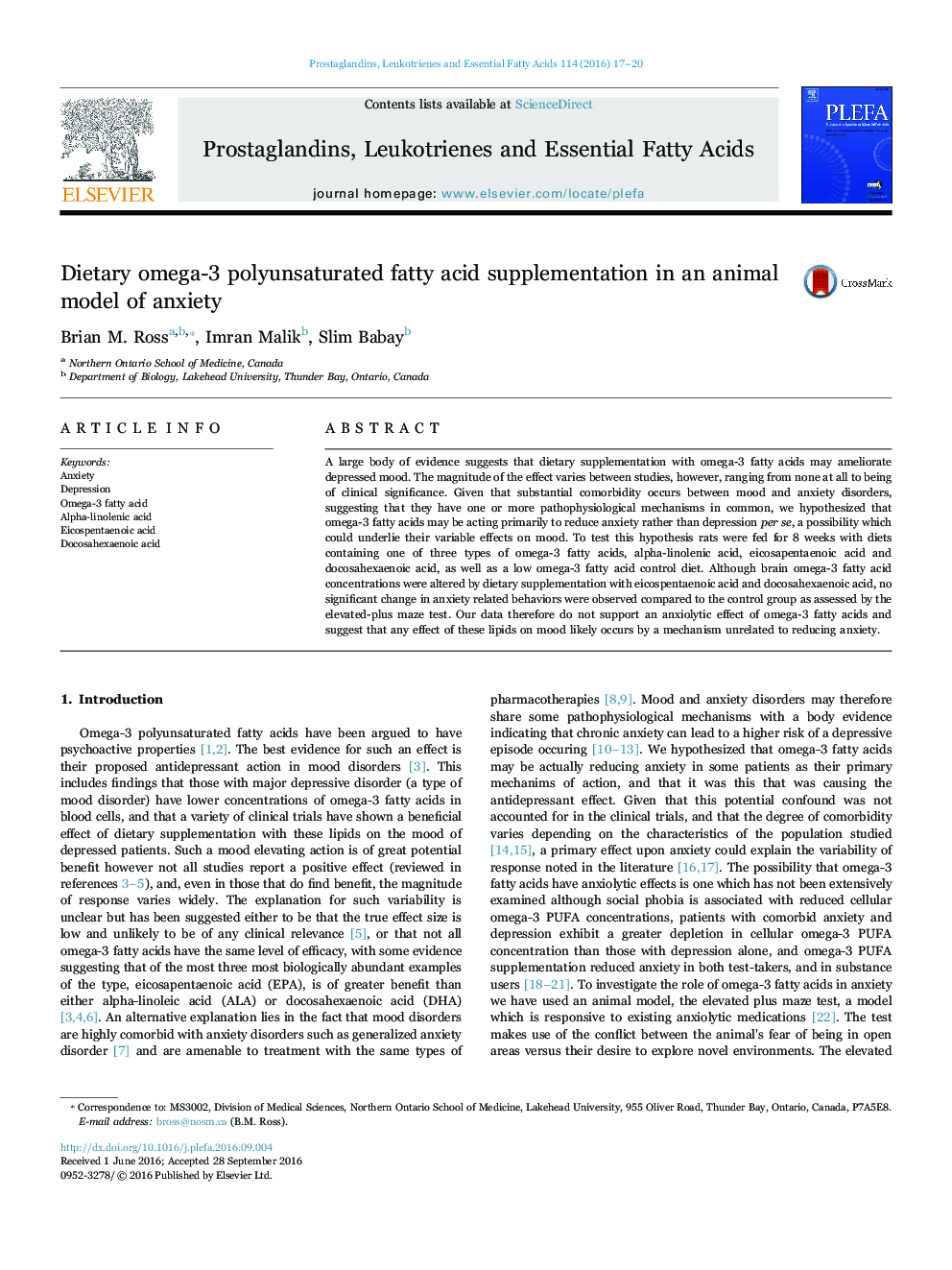| کد مقاله | کد نشریه | سال انتشار | مقاله انگلیسی | نسخه تمام متن |
|---|---|---|---|---|
| 5584918 | 1568005 | 2016 | 4 صفحه PDF | دانلود رایگان |
عنوان انگلیسی مقاله ISI
Dietary omega-3 polyunsaturated fatty acid supplementation in an animal model of anxiety
ترجمه فارسی عنوان
مکمل های اسید چرب اشباع نشده امگا -3 در یک مدل حیوانی اضطراب
دانلود مقاله + سفارش ترجمه
دانلود مقاله ISI انگلیسی
رایگان برای ایرانیان
کلمات کلیدی
ترجمه چکیده
مقدار زیادی شواهد نشان می دهد که مکمل های غذایی با اسیدهای چرب امگا 3 ممکن است خلق افسرده را کاهش دهند. میزان تأثیرات بین مطالعات متفاوت است، با این حال، از هیچ کدام به طور کلی به داشتن اهمیت بالینی نیست. با توجه به اینکه همبستگی قابل ملاحظهای بین اختلالات خلقی و اضطراب وجود دارد و نشان می دهد که آنها یک یا چند مکانیزم پاتوفیزیولوژیک مشترک دارند، ما فرض کردیم که اسید های چرب امگا 3 ممکن است در درجه اول به منظور کاهش اضطراب و نه افسردگی به طور خاص عمل کنند، اثرات متغیر بر خلق و خوی برای تست این فرضیه، موشها به مدت 8 هفته با رژیم غذایی حاوی یکی از سه نوع اسید چرب امگا 3، اسید آلفا لینولنیک، اسید ایکوزاپنتانوئیک و اسید داکوساگزنئوئیک و همچنین کمبود رژیم غذایی کم چرب امگا 3، تغذیه شدند. گرچه غلظت اسید چرب امگا 3 مغزی با مکمل های غذایی با اسید ایکوفسنتنئیک و اسید داکوزاگزائنیک اسید تغییر نکرد، تغییرات قابل ملاحظه ای در رفتارهای اضطرابی نسبت به گروه شاهد مشاهده نشد که به وسیله آزمایش ماز بالغ به دست می آید. بنابراین داده های ما اثرات ضد قارچی اسیدهای چرب امگا 3 را پشتیبانی نمی کند و نشان می دهد که هر اثر این لیپیدها بر خلق و خو احتمالا توسط یک مکانیزم ناشی از کاهش اضطراب رخ می دهد.
موضوعات مرتبط
علوم زیستی و بیوفناوری
بیوشیمی، ژنتیک و زیست شناسی مولکولی
بیوشیمی بالینی
چکیده انگلیسی
A large body of evidence suggests that dietary supplementation with omega-3 fatty acids may ameliorate depressed mood. The magnitude of the effect varies between studies, however, ranging from none at all to being of clinical significance. Given that substantial comorbidity occurs between mood and anxiety disorders, suggesting that they have one or more pathophysiological mechanisms in common, we hypothesized that omega-3 fatty acids may be acting primarily to reduce anxiety rather than depression per se, a possibility which could underlie their variable effects on mood. To test this hypothesis rats were fed for 8 weeks with diets containing one of three types of omega-3 fatty acids, alpha-linolenic acid, eicosapentaenoic acid and docosahexaenoic acid, as well as a low omega-3 fatty acid control diet. Although brain omega-3 fatty acid concentrations were altered by dietary supplementation with eicospentaenoic acid and docosahexaenoic acid, no significant change in anxiety related behaviors were observed compared to the control group as assessed by the elevated-plus maze test. Our data therefore do not support an anxiolytic effect of omega-3 fatty acids and suggest that any effect of these lipids on mood likely occurs by a mechanism unrelated to reducing anxiety.
ناشر
Database: Elsevier - ScienceDirect (ساینس دایرکت)
Journal: Prostaglandins, Leukotrienes and Essential Fatty Acids (PLEFA) - Volume 114, November 2016, Pages 17-20
Journal: Prostaglandins, Leukotrienes and Essential Fatty Acids (PLEFA) - Volume 114, November 2016, Pages 17-20
نویسندگان
Brian M. Ross, Imran Malik, Slim Babay,
